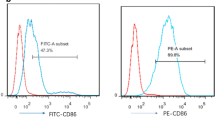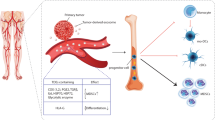Abstract
Tumor-derived exosomes (TEX) can induce a specific antitumor immune response and have been developed as a promising tumor vaccine. Despite promising preclinical data, TEX exhibit relatively low efficacy and limited clinical benefit in clinical trials. In the present study, we investigated whether exosomes from the TGF-β1 silenced L1210 cells (LEXTGF-β1si) can enhance the efficacy of DC-based vaccines. We silenced TGF-β1 in L1210 cells with a lentiviral shRNA vector and prepared the LEXTGF-β1si. It was shown that LEXTGF-β1si can significantly decrease TGF-β1 expression of dendritic cells (DC) and effectively promote their maturation and immune function. In addition, DC pulsed with LEXTGF-β1si (DCLEX-TGF-β1si) more effectively promoted CD4+ T cell proliferation in vitro and Th1 cytokine secretion and induced tumor-specific CTL response. This response was higher in potency compared to that noted by the other two formulations. Moreover, DCLEX-TGF-β1si inhibited tumor growth more efficiently than other formulations did as the preventive or therapeutic tumor vaccine. Accordingly, these findings revealed that DCLEX-TGF-β1si induced a more potent antigen-specific anti-leukemic immunity than DC pulsed with exosomes from non-manipulated L1210 cells. This indicated that the targeting of DC by LEXTGF-β1si may be used as a promising approach for leukemia immunotherapy.




Similar content being viewed by others
Abbreviations
- CTL:
-
Cytotoxic T lymphocytes
- DC:
-
Dendritic cells
- DCLEX :
-
Dendritic cells pulsed with exosomes from non-manipulated L1210 cells
- DCLEX-GFP :
-
Dendritic cells pulsed with exosomes from L1210 cells transfected with a control shRNA
- DCLEX-TGF-β1si :
-
Dendritic cells pulsed with exosomes from the TGF-β1 silenced L1210 cells
- HSP:
-
Heat shock protein
- IFN-γ:
-
Interferon-γ
- IL:
-
Interleukin
- LEX:
-
Exosomes from non-manipulated L1210 cells
- LEXGFP :
-
Exosomes from L1210 cells transfected with a control shRNA sequence
- LEXTGF-β1si :
-
Exosomes from the TGF-β1-silenced L1210 cells
- MRLs:
-
Minimal residual leukemia cells
- NK:
-
Natural killer
- TAA:
-
Tumor-associated antigens
- TEX:
-
Tumor-derived exosome(s)
- TGF-β1:
-
Transforming growth factor-β1
- TNF-α:
-
Tumor necrosis factor-α
References
Chen X, Xie H, Wood BL, Walter RB, Pagel JM, Becker PS, Sandhu VK, Abkowitz JL, Appelbaum FR, Estey EH (2015) Relation of clinical response and minimal residual disease and their prognostic impact on outcome in acute myeloid leukemia. J Clin Oncol 33(11):1258–1264
Gibbins JD, Ancelet LR, Weinkove R, Compton BJ, Painter GF, Petersen TR, Hermans IF (2014) An autologous leukemia cell vaccine prevents murine acute leukemia relapse after cytarabine treatment. Blood 124(19):2953–2963
Maeda T, Hosen N, Fukushima K, Tsuboi A, Morimoto S, Matsui T, Sata H, Fujita J, Hasegawa K, Nishida S, Nakata J, Nakae Y, Takashima S, Nakajima H, Fujiki F, Tatsumi N, Kondo T, Hino M, Oji Y, Oka Y, Kanakura Y, Kumanogoh A, Sugiyama H (2013) Maintenance of complete remission after allogeneic stem cell transplantation in leukemia patients treated with Wilms tumor 1 peptide vaccine. Blood Cancer J 3:e130
Yao Y, Wang C, Wei W, Shen C, Deng X, Chen L, Ma L, Hao S (2014) Dendritic cells pulsed with leukemia cell-derived exosomes more efficiently induce antileukemic immunities. PLoS One 9(3):e91463
Gu X, Erb U, Buchler MW, Zoller M (2015) Improved vaccine efficacy of tumor exosome compared to tumor lysate loaded dendritic cells in mice. Int J Cancer 136(4):E74–E84
Arscott WT, Camphausen KA (2011) Exosome characterization from ascitic fluid holds promise for identifying markers of colorectal cancer. Biomark Med 5(6):821–822
Petersen KE, Manangon E, Hood JL, Wickline SA, Fernandez DP, Johnson WP, Gale BK (2014) A review of exosome separation techniques and characterization of B16-F10 mouse melanoma exosomes with AF4-UV-MALS-DLS-TEM. Anal Bioanal Chem 406(30):7855–7866
Zech D, Rana S, Buchler MW, Zoller M (2012) Tumor-exosomes and leukocyte activation: an ambivalent crosstalk. Cell Commun Signal 10(1):37
Rountree RB, Mandl SJ, Nachtwey JM, Dalpozzo K, Do L, Lombardo JR, Schoonmaker PL, Brinkmann K, Dirmeier U, Laus R, Delcayre A (2011) Exosome targeting of tumor antigens expressed by cancer vaccines can improve antigen immunogenicity and therapeutic efficacy. Cancer Res 71(15):5235–5244
Andre F, Schartz NE, Chaput N, Flament C, Raposo G, Amigorena S, Angevin E, Zitvogel L (2002) Tumor-derived exosomes: a new source of tumor rejection antigens. Vaccine 20(Suppl 4):A28–A31
Nanjundappa RH, Wang R, Xie Y, Umeshappa CS, Chibbar R, Wei Y, Liu Q, Xiang J (2011) GP120-specific exosome-targeted T cell-based vaccine capable of stimulating DC-and CD4(+) T-independent CTL responses. Vaccine 29(19):3538–3547
Rao Q, Zuo B, Lu Z, Gao X, You A, Wu C, Du Z, Yin H (2016) Tumor-derived exosomes elicit tumor suppression in murine hepatocellular carcinoma models and humans in vitro. Hepatology 64(2):456–472
Wieckowski EU, Visus C, Szajnik M, Szczepanski MJ, Storkus WJ, Whiteside TL (2009) Tumor-derived microvesicles promote regulatory T cell expansion and induce apoptosis in tumor-reactive activated CD8+ T lymphocytes. J Immunol 183(6):3720–3730
Yamada N, Kuranaga Y, Kumazaki M, Shinohara H, Taniguchi K, Akao Y (2016) Colorectal cancer cell-derived extracellular vesicles induce phenotypic alteration of T cells into tumor-growth supporting cells with transforming growth factor-beta1-mediated suppression. Oncotarget 7(19):27033–27043
Li W, Mu D, Tian F, Hu Y, Jiang T, Han Y, Chen J, Han G, Li X (2013) Exosomes derived from Rab27a-overexpressing tumor cells elicit efficient induction of antitumor immunity. Mol Med Rep 8(6):1876–1882
Yang Y, Xiu F, Cai Z, Wang J, Wang Q, Fu Y, Cao X (2007) Increased induction of antitumor response by exosomes derived from interleukin-2 gene-modified tumor cells. J Cancer Res Clin Oncol 133(6):389–399
Dai S, Zhou X, Wang B, Wang Q, Fu Y, Chen T, Wan T, Yu Y, Cao X (2006) Enhanced induction of dendritic cell maturation and HLA-A*0201-restricted CEA-specific CD8(+) CTL response by exosomes derived from IL-18 gene-modified CEA-positive tumor cells. J Mol Med (Berl) 84(12):1067–1076
Wang J, Wang L, Lin Z, Tao L, Chen M (2014) More efficient induction of antitumor T cell immunity by exosomes from CD40L gene-modified lung tumor cells. Mol Med Rep 9(1):125–131
Fan W, Tian XD, Huang E, Zhang JJ (2013) Exosomes from CIITA-transfected CT26 cells enhance anti- tumor effects. Asian Pac J Cancer Prev 14(2):987–991
Hao S, Bai O, Li F, Yuan J, Laferte S, Xiang J (2007) Mature dendritic cells pulsed with exosomes stimulate efficient cytotoxic T-lymphocyte responses and antitumour immunity. Immunology 120(1):90–102
Hong CS, Muller L, Whiteside TL, Boyiadzis M (2014) Plasma exosomes as markers of therapeutic response in patients with acute myeloid leukemia. Front Immunol 5:160
Yang C, Kim SH, Bianco NR, Robbins PD (2011) Tumor-derived exosomes confer antigen-specific immunosuppression in a murine delayed-type hypersensitivity model. PLoS One 6(8):e22517
Lv LH, Wan YL, Lin Y, Zhang W, Yang M, Li GL, Lin HM, Shang CZ, Chen YJ, Min J (2012) Anticancer drugs cause release of exosomes with heat shock proteins from human hepatocellular carcinoma cells that elicit effective natural killer cell antitumor responses in vitro. J Biol Chem 287(19):15874–15885
Morelli AE, Larregina AT, Shufesky WJ, Sullivan ML, Stolz DB, Papworth GD, Zahorchak AF, Logar AJ, Wang Z, Watkins SC, Falo LD Jr, Thomson AW (2004) Endocytosis, intracellular sorting, and processing of exosomes by dendritic cells. Blood 104(10):3257–3266
Kunigelis KE, Graner MW (2015) The dichotomy of tumor exosomes (TEX) in cancer immunity: is it all in the ConTEXt? Vaccines (Basel) 3(4):1019–1051
Dai S, Wei D, Wu Z, Zhou X, Wei X, Huang H, Li G (2008) Phase I clinical trial of autologous ascites-derived exosomes combined with GM-CSF for colorectal cancer. Mol Ther 16(4):782–790
Rong L, Li R, Li S, Luo R (2016) Immunosuppression of breast cancer cells mediated by transforming growth factor-beta in exosomes from cancer cells. Oncol Lett 11(1):500–504
Raimondo S, Saieva L, Corrado C, Fontana S, Flugy A, Rizzo A, De Leo G, Alessandro R (2015) Chronic myeloid leukemia-derived exosomes promote tumor growth through an autocrine mechanism. Cell Commun Signal 13:8
Soares KC, Rucki AA, Kim V, Foley K, Solt S, Wolfgang CL, Jaffee EM, Zheng L (2015) TGF-beta blockade depletes T regulatory cells from metastatic pancreatic tumors in a vaccine dependent manner. Oncotarget 6(40):43005–43015
Conroy H, Galvin KC, Higgins SC, Mills KH (2012) Gene silencing of TGF-beta1 enhances antitumor immunity induced with a dendritic cell vaccine by reducing tumor-associated regulatory T cells. Cancer Immunol Immunother 61(3):425–431
Volovitz I, Melzer S, Amar S, Bocsi J, Bloch M, Efroni S, Ram Z, Tarnok A (2016) Dendritic cells in the context of human tumors: biology and experimental tools. Int Rev Immunol 35(2):116–135
Lucey DR, Clerici M, Shearer GM (1996) Type 1 and type 2 cytokine dysregulation in human infectious, neoplastic, and inflammatory diseases. Clin Microbiol Rev 9(4):532–562
Acknowledgements
This research was supported by the National Natural Science Foundation of China (Grant No. 81470314).
Author information
Authors and Affiliations
Corresponding author
Ethics declarations
Conflict of interest
The authors declare that they have no conflict of interest.
Rights and permissions
About this article
Cite this article
Huang, F., Wan, J., Hao, S. et al. TGF-β1-silenced leukemia cell-derived exosomes target dendritic cells to induce potent anti-leukemic immunity in a mouse model. Cancer Immunol Immunother 66, 1321–1331 (2017). https://doi.org/10.1007/s00262-017-2028-5
Received:
Accepted:
Published:
Issue Date:
DOI: https://doi.org/10.1007/s00262-017-2028-5




